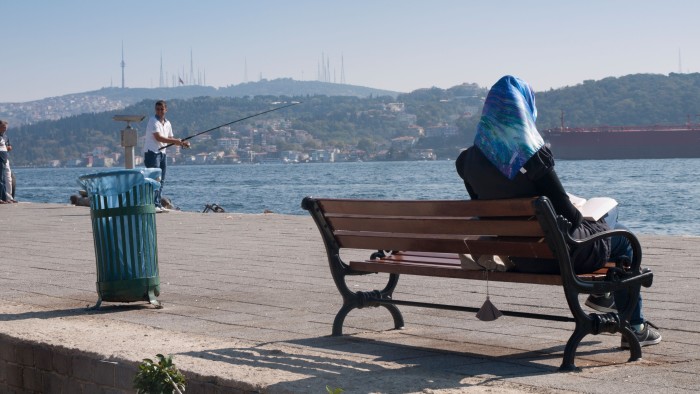Unlock the Editor’s Digest for free
Roula Khalaf, Editor of the FT, selects her favourite stories in this weekly newsletter.
This article is part of FT Globetrotter’s guide to Istanbul
“Stop! Let the coffee water boil / Tell me about Istanbul, how was it?” asks the Anatolian rocker Cem Karaca in his anguished ballad “Always Suffering”.
Karaca, who spent eight years in political exile in the 1980s, implores his companion to “tell me people laughed there”, adding: “I like it, even if it’s a lie.”
The conflict between the romantic image of Istanbul and the myriad struggles of its inhabitants is a theme that runs through many of the books below, which I’ve picked for their accessible routes into Turkey’s history, culture and modern politics. They also offer levity, beauty and some great stories.
Reading them brought back memories of my seven years working in the country as a correspondent.
Enjoy over a cup of piping-hot black tea or a short, bracing Turkish coffee — ideally with an Istanbul street cat curled up at your side.
‘Midnight at the Pera Palace’ by Charles King (2014)

This is the story of the birth of modern Istanbul, told through the city’s famous Pera Palace hotel. King, a Georgetown professor with an eye for a good story, gallops through the collapse of the Ottoman Empire and the decades that followed in a whirl of excitement, upheaval and violence. The book is filled with colourful tales about spies, Bolshevik assassins and a dance joint called Maxim that “helped train an entire generation of Istanbullus to do the foxtrot”. It is also a lament for the Greeks, Jews and Armenians who were once a central part of the city’s fabric but fell victim to the modern Turkish republic’s mission to “squeeze” the population into “a single national identity”.
‘Dare to Disappoint: Growing up in Turkey’ by Özge Samancı (2015)

On one level this is a deeply personal graphic memoir by Samancı, a US-based artist who was born in 1975 and grew up in the coastal city of Izmir. But it also tackles a raft of political topics and helps unlock the answers to some pressing questions: why are there pictures of Atatürk everywhere? Why do so many Turkish parents want their children to become engineers? Why was it a forbidden pleasure in the 1980s to eat cornflakes? This is a sweet, irreverent and also practical companion to understanding life in Turkey. It’s also short — and can be read in one fell swoop over five or six glasses of çay (tea).
‘Istanbul, Istanbul: A Novel’ by Burhan Sönmez (2015)

Watching the sun set over the Bosphorus or ambling down a cobbled Beyoğlu street, it can be hard to reconcile the beauty and charm of a visit to Istanbul with the headlines about relentless political repression under President Recep Tayyip Erdoğan. This novel by Burhan Sönmez, the Kurdish novelist and current president of PEN International who lives between Istanbul and Cambridge, seeks to bring those two worlds together. An absurd and sad prison novel set in grim underground cells, the characters tell stories to forget the pain of their torture and keep themselves alive. Set in an unspecified time, it could unfortunately apply to much of the past century as cycles of repression and retribution have repeated themselves, seemingly without end.
‘Istanbul: Memories and the City’ by Orhan Pamuk (2003)

Turkey’s Nobel laureate deals with sibling rivalry, art, love and melancholy in this book, which is partly the story of his own childhood, part biography of Istanbul. Some passages, such as his descriptions of Istanbul as a drab “black-and-white city” that “has been in decline for a hundred and fifty years”, are barely recognisable in the colourful, frenetic megacity of today — although crushing poverty is still rife. Other aspects are evergreen. He muses on the impact of urban development on memory and culture. He wrestles with Turkey’s “love-hate relationship with the western gaze”. And he explores what it means to love a place and use it as a canvas when, in reality, “anything we say about the city’s essence says more about our own lives and our own states of mind”.
‘To the City: Life and Death along the Ancient Walls of Istanbul’ by Alexander Christie-Miller (2024)

A beautifully written and sharply observed guide to the sociopolitical conflict of the Erdoğan era, told through the story of Istanbul’s old Byzantine city walls and the people who live among them. Christie-Miller gives space to a government supporter who finds yearned-for solidarity in the ruling party’s community networks, a Kurdish political activist fed up with being treated by his neighbours like a cave-dweller, and a woman who embodies Istanbul’s extraordinary commitment to street animals by running a shelter that cares for 3,000 dogs. He lets their stories unfold slowly, telling them with empathy and interest. Unusually, the book intersperses these tales with the story of Mehmet the Conqueror and his vanquishing of the city in 1453 — a moment that is a “talisman of modern Turkish identity” and is constantly evoked by today’s president.
Which books best evoke Istanbul for you? Share your recommendations in the comments below. And follow us on Instagram at @ftglobetrotter
Cities with the FT
FT Globetrotter, our insider guides to some of the world’s greatest cities, offers expert advice on eating and drinking, exercise, art and culture — and much more
Find us in Istanbul, London, New York, Los Angeles, Tokyo, Lagos, Paris, Rome, Singapore, Hong Kong, Miami, Toronto, Madrid, Melbourne, Frankfurt, Copenhagen, Zürich, Milan, Vancouver, Edinburgh and Venice

